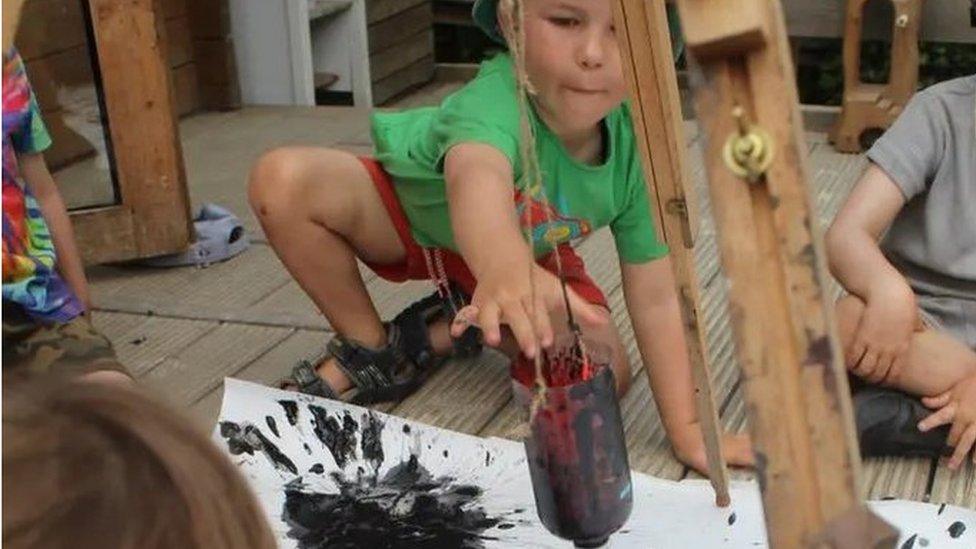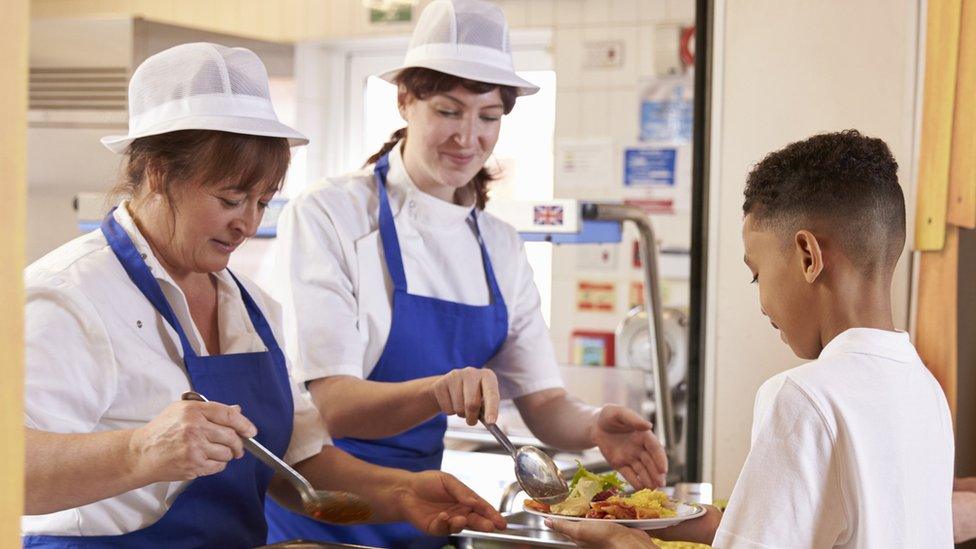Parents likely to face rise in nursery costs
- Published

In England, all three and four-year-olds receive at least 15 hours of free childcare per week, for 38 weeks of the year.
Nurseries will raise prices or close because of a real-terms funding cut, early years providers have warned.
Government spending on free childcare for young children in England is set to fall by 8% in real terms over the next two years, according to the Institute for Fiscal Studies (IFS).
The Early Years Alliance says 4,000 nurseries and childminder services have closed in the past year.
The government says it is putting an extra £160m into early years this year.
But new analysis from the IFS, external says funding is not keeping up with rising energy bills and other costs.
Geoff Parkes, whose family run two nurseries in West Yorkshire, has already had to pass on rising costs to parents, and is going to have put up prices again.
"We're looking at the cost of the business absolutely ruthlessly, in terms of how can we save more energy?" he told the BBC.
Some parents have had to stop sending their children, he said, while others have been cutting down on the number of hours they send them in each week.
Mr Parkes thinks it is vital that parents know that the prices have to rise to keep up the quality of provision, which includes things like forest school, where children play and learn outdoors, to further children's development.
"I think there's a misnomer in the UK that it's almost quasi-babysitting, and it's not. We have qualified childcare professionals, experts in their field who are educators," he said.
"We don't want to start employing lower-cost staff. That can't be the right thing to do."

Geoff Parkes says his nurseries focus on children's educational development, rather than "babysitting"
In England, all three and four-year-olds receive at least 15 hours of free childcare per week, for 38 weeks of the year.
This increases to 30 hours for working parents, provided their income meets the eligibility criteria., external
Two-year-olds in England are also eligible for 15 hours of free childcare under certain circumstances, for example if the family receives universal credit or the child is in foster care.
The IFS report also says government spending on subsidies for parents on benefits has fallen sharply over the past decade.
Real-terms spending on free childcare hours has more than doubled from about £1.7bn in 2009/10 to more than £4bn last year, the IFS says.
But it says childcare providers' costs are likely to rise quicker than funding in the next few years - by 9% by 2025.
Christine Farquharson, a senior research economist at the IFS, told the BBC: "The more that childcare providers struggle to make the free entitlement work for them financially on the funding rate the government gives them, the more they have to look at a menu of quite unpalatable options.
"That might include limiting access to the children who can get their free entitlement, it might include raising prices on children in other age groups - particularly one and two-year-olds - or, in the worst cases, it might include going out of business entirely."


For many parents in England the cost of nursery or a childminder is as great as their rent or mortgage.
There are now more hours free to parents than a decade ago, but family finances are also facing their biggest squeeze in a generation.
So the care and early years learning of pre-school children is becoming a hot political issue. It could be one of the big battlegrounds ahead of the next election.
While the government points to higher child-to-staff ratios in other countries, Labour has been looking at Estonia where childcare is highly subsidised for parents.

Neil Leitch, chief executive of the Early Years Alliance, which represents providers, said 4,000 settings had closed for good in the past year.
"Many nurseries, pre-schools and childminders are already teetering on the edge of survival," he said.
"It is almost impossible to imagine how the sector will be able to survive with such a significant real-terms funding drop."
The government is looking into plans to let nurseries and childminders look after more two-year-olds in England, to help them save money on staffing costs.
But Ms Farquharson said loosening the rules would make little difference because many places already chose to take on fewer children than they could.
A government spokeswoman said it was "exploring a wide range of options" to improve parents' access to "affordable, flexible childcare".
"We have also already increased funding to local authorities to increase the hourly rates they pay to childcare providers, and we're providing further support for early years' providers with their energy costs," she said.
Bridget Phillipson, Labour's shadow education secretary, said parents "will face even higher bills or more nursery closures".
She said Labour would offer breakfast clubs for every primary school child in England and "enable councils to open new maintained nurseries".

Are nursery costs increasing for you? Is your nursery closing? Share your experiences by emailing haveyoursay@bbc.co.uk, external.
Please include a contact number if you are willing to speak to a BBC journalist. You can also get in touch in the following ways:
WhatsApp: +44 7756 165803
Tweet: @BBC_HaveYourSay, external
Please read our terms & conditions and privacy policy
If you are reading this page and can't see the form you will need to visit the mobile version of the BBC website to submit your question or comment or you can email us at HaveYourSay@bbc.co.uk, external. Please include your name, age and location with any submission.
Related topics
- Published28 September 2022
